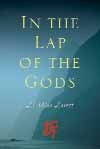SEJournal Online is the digital news magazine of the Society of Environmental Journalists. Learn more about SEJournal Online, including submission, subscription and advertising information.

Book Shelf
In the Lap of the Gods
By Li Miao Lovett
Leapfrog Press, $15.95
Reviewed by Karen Schaefer
The waters of the Yangtse River are rising rapidly, swallowing the unharvested fields, and lapping at the door of a small, deserted house.
Illiterate scavenger Liu Renfu knows he has little time left if he wants to find anything of value the owners may have left behind in their haste to escape the flooding. But before he can begin his search, Liu hears the cries of a baby. Scooping up the child, Liu rescues the abandoned infant, setting himself on a path that will lead him to try to reclaim his life in the new, industrial China.
In the Lap of the Gods is San Francisco writer and debut novelist Li Miao Lovett’s fictionalized account of the human story behind the physical and cultural displacement of more than a million Chinese people by the creation of the Three Gorges Dam on the Yangtse River.
Touted as the largest engineering feat since the construction of the Great Wall, the dam is the biggest hydroelectric project ever built, with 26 turbines, each capable of producing 700 megawatts of electricity. The Chinese government regards the project — completed in 2008 — as a historic, social and economic success.
But both inside China and abroad, the Three Gorges Dam has sparked major controversy. The dam’s reservoir flooded archaeological and cultural sites, swallowed millions of acres of some of China's most arable land, and caused massive environmental changes, including frequent landslides and significant erosion and sedimentation. It also displaced more than 1.3 million people, many whose ancestors had lived in their riverside villages for hundreds, if not thousands, of years.
It’s this mass migration of villages, towns and farms — and the cultural and economic upheaval it engenders — on which Lovett focuses her story.
Liu Renfu, desperate for cash, reluctantly tries to sell the baby girl he rescued from the flood, but is foiled by a vehicle breakdown. A former day laborer who hauled coal to ships docked at the small port of Fengjie, Liu is forced to scavenge for a living.
Old Fengjie is now under water and Liu has moved to nearby Wushan, a new city built above the rising floods. With only a fourth-grade education, Liu’s job options are limited and caring for the baby — whom he names Rose — takes much of his time. His only friends are the owner of a local noodle shop, an elderly woman with Alzheimer’s who babysits Rose with disastrous results, and a wily old merchant and Cultural Revolution survivor, Fang Shuping, who fences the salvaged goods Liu finds.
In her lucid and sometimes damning narrative, Lovett explores the ways in which people try to adapt to the changing physical, political, and economic landscape that is the new Yangtse.
Liu, who lost his first wife and unborn child to a river accident, marries again, this time to Chang Mei Ling, a young woman whose farmer parents have been forced by government officials to move to less productive land.
Mei Ling has stayed behind to work as a waitress at Liu’s favorite noodle shop, sending most of her paycheck back to her parents. But Mei Ling has difficulty adjusting to life as a wife and mother of young Rose.
When Liu is laid up with a broken leg after finding steadier work on one of the new tourist boats plying the Yangtse, Mei Ling moves away to a better paid job in a larger city, leaving the young family broken and bereft.
The climax comes as Fang Shuping, the wily businessman, discovers that Liu’s orphaned Rose is the granddaughter of the lost love of his youth. He agrees to assist his former lover’s village leaders as they move to higher, less fertile ground while the waters of the Yangtse continue to rise. The villagers stage a mass protest, hoping to gain media attention to their plight. But in the turmoil, lives are lost that might have been reunited. And the rising flood of the Three Gorges Dam reclaims its own.
Li Miao Lovett’s In the Lap of the Gods doesn’t approach what John Steinbeck might have accomplished with this classic tale of environmental and human catastrophe. But it doesn’t need to. Her sparse prose and almost journalistic approach sharply characterize the lives of Chinese people in the ongoing human drama that is the ever-changing landscape of globalized China today.
Stamped in red letters on the book’s cover — and on every chapter page — is the Chinese character written on every building along the Yangtse destined for demolition. That subtle symbol alone is enough to convey the message that China’s past and present are still in constant flux.
Karen Schaefer is an Ohio-based freelance journalist with a background in both broadcast and print.
* From the quarterly newsletter SEJournal, Summer/Fall 2012. Each new issue of SEJournal is available to members and subscribers only; find subscription information here or learn how to join SEJ. Past issues are archived for the public here.












 Advertisement
Advertisement 



